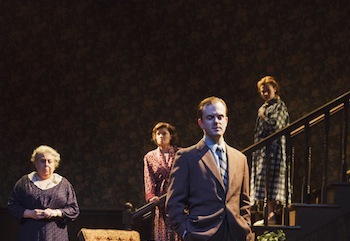A 1950s Harvest Moon Rises Over Tragedies in a Small Texas Town
Harrison, TX: Three Plays by Horton Foote
Primary Stages/59E59 Theaters
59 E. 59th Street
New York, N.Y.

The story of Harrison, a small town in Texas, opens in the autumn of 1956 with a shining, promising harvest moon rising over the wind-blown meadows. The bright, glowing moon masks terrible tragedy below in three tales that, tied together, tell the story of lives gone very wrong. The plays, which opened Wednesday, are carried along by a vivid sense of narrative by playwright Foote that provides a wonderful portrait of a small burg that explodes with violence and tension in three separate but dynamic stories.
It is a solid history play. The three one-acts, filled with references to the 1920s and 1950s, give the audience a nice look at big, bawdy Texas just four years before Lyndon Johnson became Kennedy's vice president and around the time the classic Texas movie Giant debuted. It isn’t just the references that smack of history, though. It is the comparison of what we have today, in psychiatric care, medicine and technology, and the way we see each other, that strikes such a demonstrative historical contrast with life in Texas nearly sixty years ago.
In the first story, Blind Date, set in 1928, a doting woman in her sixties, played well by Hallie Foote, the playwright’s daughter, attempts to fix up her troublesome niece Sarah Nancy with a local boy on a blind date. Sarah Nancy has no interest in the project and does all she can to rebuff the boy, who had no desire to see her, either. It is a touching and funny little story, carried along at a perfect pace by actress Foote, a story about teenage dating that could have been written last night. The story does not have a very satisfying ending, but it strikes a lot of warm chords.
In story two, The One-Armed Man, set in 1928, C.W. Rowe, the successful owner of a factory that works with cotton, is confronted by a young man, McHenry, who lost his arm in a plant accident. Rowe, who fired him after the accident, tries to placate him with $5 bills, unwilling and unable to understand why he is so angry at him. Rowe does not comprehend the plight of another of his workers, who lives in crushing poverty due to low wages. It is a classic tale of the angry worker against the wealthy boss, but it has plenty of pleasing twists and turns. In it, there are constant historical references to the 1920s: Rowe’s $3,000 house, PInkey’s $40 a week salary, racial hatred, bad labor relations and the battles of old small companies with new ones that feature massive technological machinery.
Tale three, The Midnight Caller, the best of them, set in 1956, features a soaring performance by Broadway star Jayne Houdyshell (who was nominated for a Tony for her performance in Follies) as Rowena, an aging woman who never married and lives at a Harrison boarding house with a half dozen other single women. Their lives are disrupted when, at the same time, the first man to ever reside there, Ralph Johnston, moves in and so does the gorgeous, notorious Helen Crews, recently split from her wealthy boyfriend of four years, Harvey Weems. The women who live there, especially Alma Jean Jordan, a spinster for seventeen years, flirt with Ralph and gossip about Helen until the night that everything exploded. It is a well-staged, powerfully directed story of people who should have led happy lives and did not, and now have to cope with their place on the lower rungs of life, smiling about fate every hour of the day.
The three stories, separately and collectively, make up sturdy history and smooth, yet gripping, theater. Director Pam MacKinnon, recently nominated for a Tony for her work on Clybourne Park, has done a superb job of bringing tiny little Harrison, and its tiny people, to life in an engaging, entertaining and big, big way.
It is the sense of historical loss that you feel that makes this such a wonderful three story night at the theater, though. It is 1928 and Sarah Nancy, the teenage girl in Blind Date, is fully expected to act like an idiot to win the attention of boys in town, using her good looks, and not her brains, to become a social success. She does not want to do that. She cannot do that. She is a forceful woman with plenty of smarts tied down in a rural "prison" in the small world of women in 1928, endlessly repressed. Her granddaughter in the 1970s and '80s will, with her friends, lead the women’s movement and changed the country. You can see that fierceness in Sarah Nancy and feel it in the raw anger she exhibits in the story.
Harrison watched the harvest moon rise, cheered for the small-town football team, hugged each other when tragedy struck and cheered for each other when triumph arrived, just like everybody else in America in those decades. Foote, in these three stirring one-act plays, provides today’s audience with a haunting and yet loving portrait of people from the past who tried to get along the best they could, suffering lots of tragedies but lots of triumphs, too.
Director Mackinnon has done a superb job of weaving together the action in all three plays. She received fine work from actors Houdyshell and Foote, Devon Abner, Andre Lynn Green, Evan Jonigkeit, Jeremy Bobb, Alexander Cendese, Mary Bacon and Jenny Dare Paulin.
PRODUCTION: Produced by Primary Stages and 59E59 Theaters. Sets: Marion Williams; Costumes: Raye Voyce; Lighting: Tyler Micoleau; Music and Sound: Broken Chord. The play is directed by Pam MacKinnon.
